Taxation Assignment 1: Black Economy and Shared Economy Analysis
VerifiedAdded on 2019/11/12
|15
|3599
|153
Report
AI Summary
This report, titled "Taxation Assignment 1," delves into the concepts of the black economy and the shared economy. It begins by defining the black economy as activities outside the regulatory purview and tax net of a country, contrasting it with the white economy. The report then introduces the shared economy as an economic system where individuals share assets, such as goods and services, for monetary fees or free of cost, aiming for higher efficiency and welfare. The report then transitions to a comparative analysis of two businesses in the hospitality industry: Airbnb and Four Seasons Hotel. It examines how Airbnb, operating under the shared economy model, facilitates lodging rentals and faces unique taxation challenges, particularly in Australia where it accounts for transactions under Airbnb Ireland. In contrast, Four Seasons Hotel operates under a traditional economic model. The report highlights the implications of these differing business models and their impact on taxation frameworks within the Australian context, providing a detailed exploration of these economic concepts and their real-world applications.
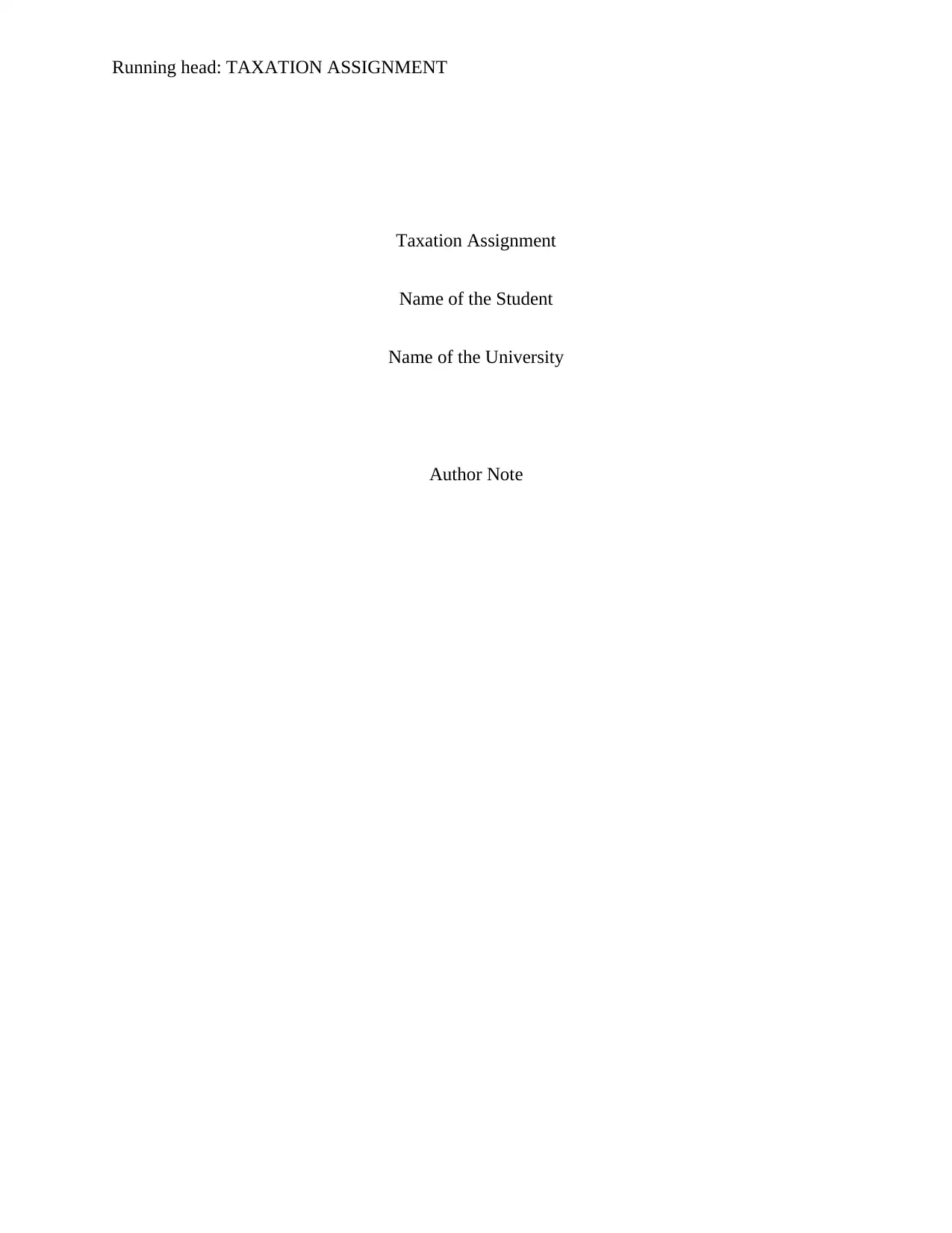
Running head: TAXATION ASSIGNMENT
Taxation Assignment
Name of the Student
Name of the University
Author Note
Taxation Assignment
Name of the Student
Name of the University
Author Note
Paraphrase This Document
Need a fresh take? Get an instant paraphrase of this document with our AI Paraphraser
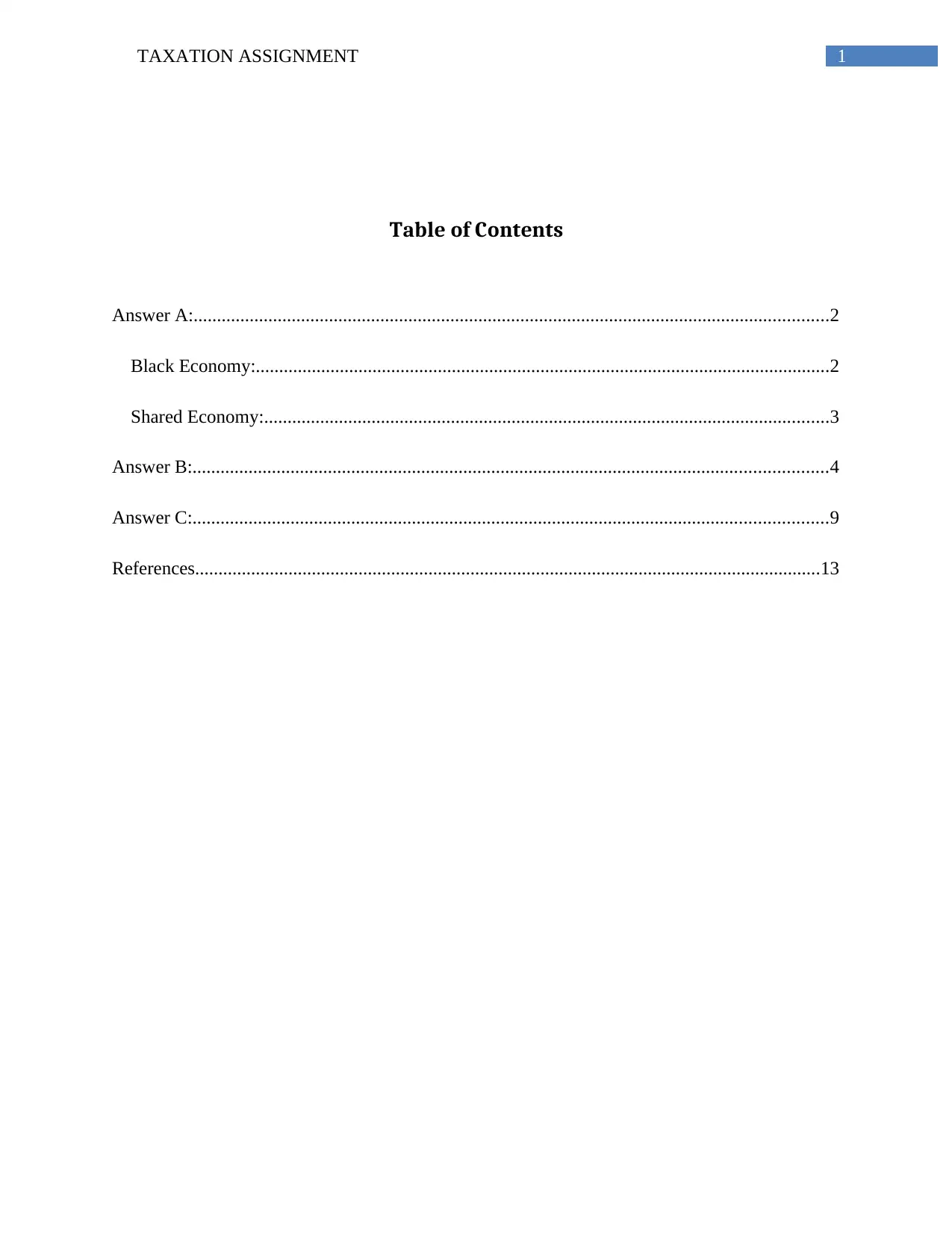
1TAXATION ASSIGNMENT
Table of Contents
Answer A:........................................................................................................................................2
Black Economy:...........................................................................................................................2
Shared Economy:.........................................................................................................................3
Answer B:........................................................................................................................................4
Answer C:........................................................................................................................................9
References......................................................................................................................................13
Table of Contents
Answer A:........................................................................................................................................2
Black Economy:...........................................................................................................................2
Shared Economy:.........................................................................................................................3
Answer B:........................................................................................................................................4
Answer C:........................................................................................................................................9
References......................................................................................................................................13
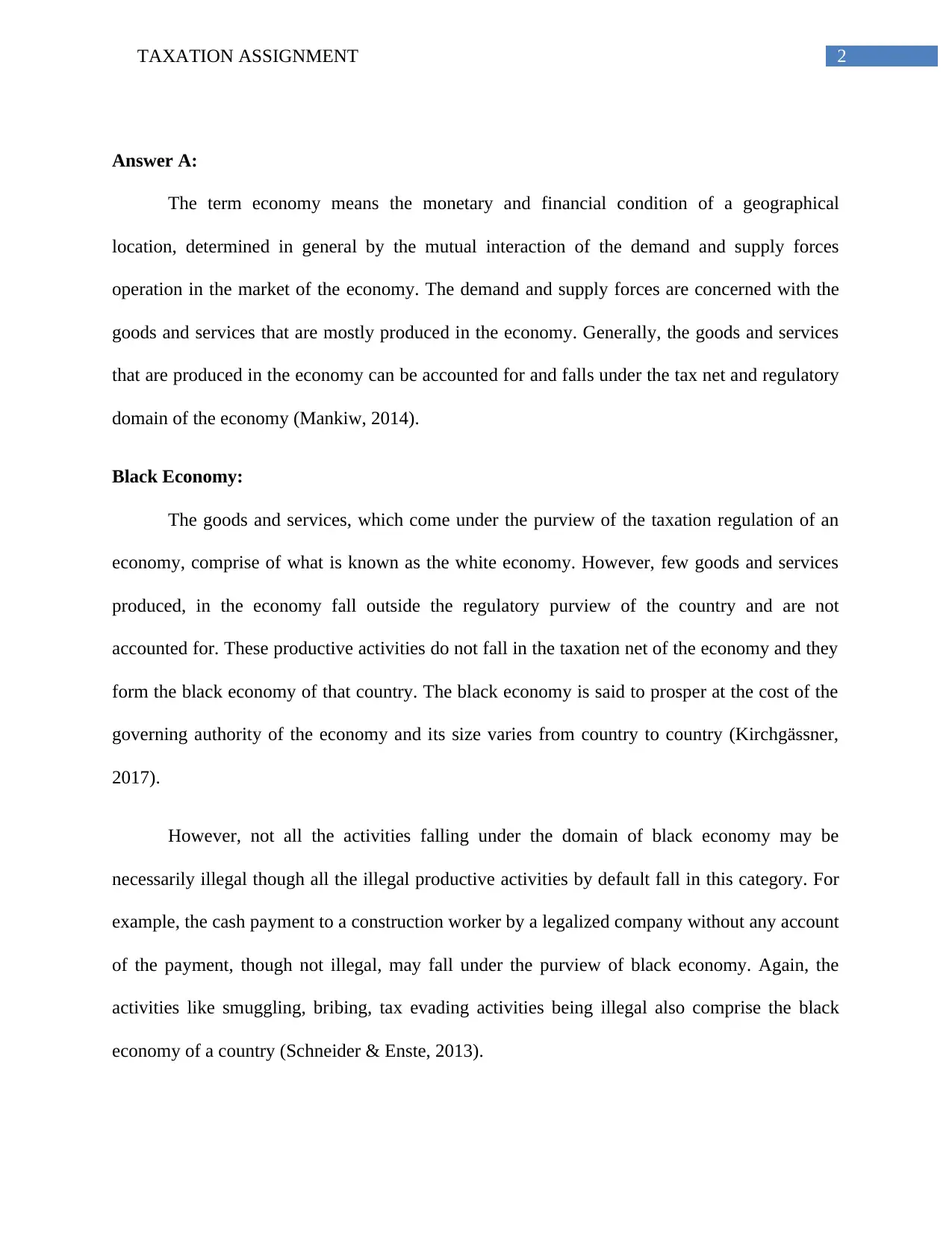
2TAXATION ASSIGNMENT
Answer A:
The term economy means the monetary and financial condition of a geographical
location, determined in general by the mutual interaction of the demand and supply forces
operation in the market of the economy. The demand and supply forces are concerned with the
goods and services that are mostly produced in the economy. Generally, the goods and services
that are produced in the economy can be accounted for and falls under the tax net and regulatory
domain of the economy (Mankiw, 2014).
Black Economy:
The goods and services, which come under the purview of the taxation regulation of an
economy, comprise of what is known as the white economy. However, few goods and services
produced, in the economy fall outside the regulatory purview of the country and are not
accounted for. These productive activities do not fall in the taxation net of the economy and they
form the black economy of that country. The black economy is said to prosper at the cost of the
governing authority of the economy and its size varies from country to country (Kirchgässner,
2017).
However, not all the activities falling under the domain of black economy may be
necessarily illegal though all the illegal productive activities by default fall in this category. For
example, the cash payment to a construction worker by a legalized company without any account
of the payment, though not illegal, may fall under the purview of black economy. Again, the
activities like smuggling, bribing, tax evading activities being illegal also comprise the black
economy of a country (Schneider & Enste, 2013).
Answer A:
The term economy means the monetary and financial condition of a geographical
location, determined in general by the mutual interaction of the demand and supply forces
operation in the market of the economy. The demand and supply forces are concerned with the
goods and services that are mostly produced in the economy. Generally, the goods and services
that are produced in the economy can be accounted for and falls under the tax net and regulatory
domain of the economy (Mankiw, 2014).
Black Economy:
The goods and services, which come under the purview of the taxation regulation of an
economy, comprise of what is known as the white economy. However, few goods and services
produced, in the economy fall outside the regulatory purview of the country and are not
accounted for. These productive activities do not fall in the taxation net of the economy and they
form the black economy of that country. The black economy is said to prosper at the cost of the
governing authority of the economy and its size varies from country to country (Kirchgässner,
2017).
However, not all the activities falling under the domain of black economy may be
necessarily illegal though all the illegal productive activities by default fall in this category. For
example, the cash payment to a construction worker by a legalized company without any account
of the payment, though not illegal, may fall under the purview of black economy. Again, the
activities like smuggling, bribing, tax evading activities being illegal also comprise the black
economy of a country (Schneider & Enste, 2013).
⊘ This is a preview!⊘
Do you want full access?
Subscribe today to unlock all pages.

Trusted by 1+ million students worldwide
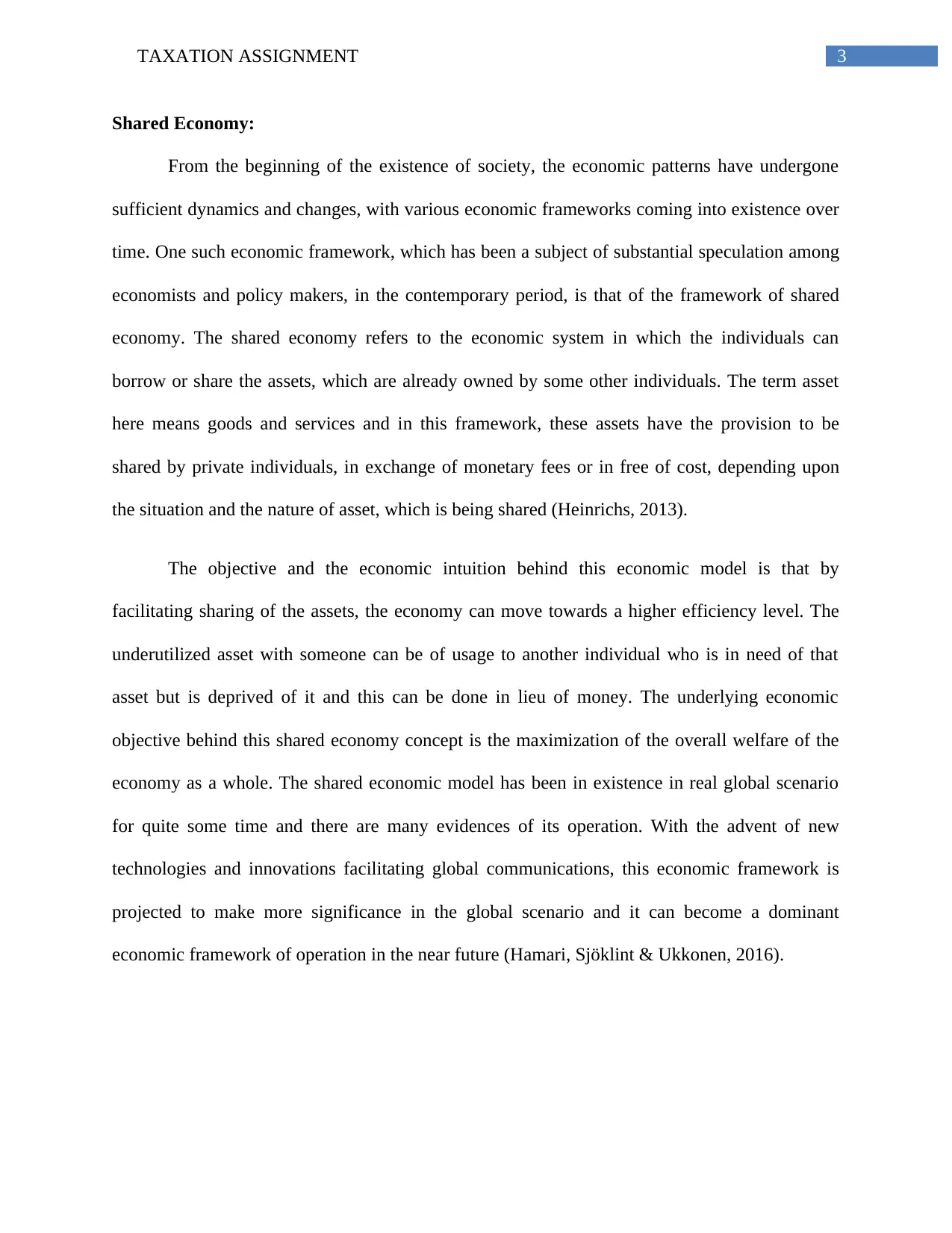
3TAXATION ASSIGNMENT
Shared Economy:
From the beginning of the existence of society, the economic patterns have undergone
sufficient dynamics and changes, with various economic frameworks coming into existence over
time. One such economic framework, which has been a subject of substantial speculation among
economists and policy makers, in the contemporary period, is that of the framework of shared
economy. The shared economy refers to the economic system in which the individuals can
borrow or share the assets, which are already owned by some other individuals. The term asset
here means goods and services and in this framework, these assets have the provision to be
shared by private individuals, in exchange of monetary fees or in free of cost, depending upon
the situation and the nature of asset, which is being shared (Heinrichs, 2013).
The objective and the economic intuition behind this economic model is that by
facilitating sharing of the assets, the economy can move towards a higher efficiency level. The
underutilized asset with someone can be of usage to another individual who is in need of that
asset but is deprived of it and this can be done in lieu of money. The underlying economic
objective behind this shared economy concept is the maximization of the overall welfare of the
economy as a whole. The shared economic model has been in existence in real global scenario
for quite some time and there are many evidences of its operation. With the advent of new
technologies and innovations facilitating global communications, this economic framework is
projected to make more significance in the global scenario and it can become a dominant
economic framework of operation in the near future (Hamari, Sjöklint & Ukkonen, 2016).
Shared Economy:
From the beginning of the existence of society, the economic patterns have undergone
sufficient dynamics and changes, with various economic frameworks coming into existence over
time. One such economic framework, which has been a subject of substantial speculation among
economists and policy makers, in the contemporary period, is that of the framework of shared
economy. The shared economy refers to the economic system in which the individuals can
borrow or share the assets, which are already owned by some other individuals. The term asset
here means goods and services and in this framework, these assets have the provision to be
shared by private individuals, in exchange of monetary fees or in free of cost, depending upon
the situation and the nature of asset, which is being shared (Heinrichs, 2013).
The objective and the economic intuition behind this economic model is that by
facilitating sharing of the assets, the economy can move towards a higher efficiency level. The
underutilized asset with someone can be of usage to another individual who is in need of that
asset but is deprived of it and this can be done in lieu of money. The underlying economic
objective behind this shared economy concept is the maximization of the overall welfare of the
economy as a whole. The shared economic model has been in existence in real global scenario
for quite some time and there are many evidences of its operation. With the advent of new
technologies and innovations facilitating global communications, this economic framework is
projected to make more significance in the global scenario and it can become a dominant
economic framework of operation in the near future (Hamari, Sjöklint & Ukkonen, 2016).
Paraphrase This Document
Need a fresh take? Get an instant paraphrase of this document with our AI Paraphraser
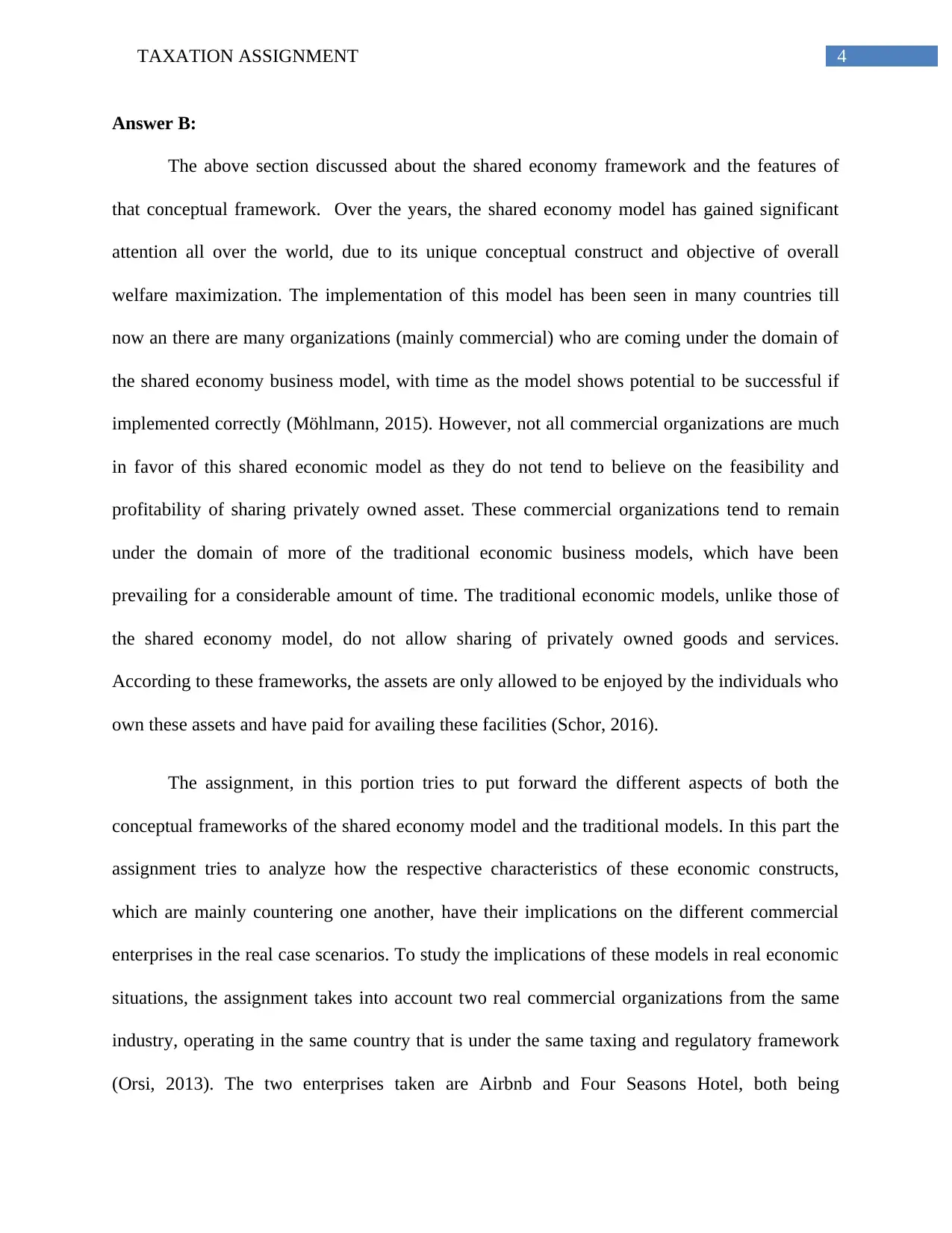
4TAXATION ASSIGNMENT
Answer B:
The above section discussed about the shared economy framework and the features of
that conceptual framework. Over the years, the shared economy model has gained significant
attention all over the world, due to its unique conceptual construct and objective of overall
welfare maximization. The implementation of this model has been seen in many countries till
now an there are many organizations (mainly commercial) who are coming under the domain of
the shared economy business model, with time as the model shows potential to be successful if
implemented correctly (Möhlmann, 2015). However, not all commercial organizations are much
in favor of this shared economic model as they do not tend to believe on the feasibility and
profitability of sharing privately owned asset. These commercial organizations tend to remain
under the domain of more of the traditional economic business models, which have been
prevailing for a considerable amount of time. The traditional economic models, unlike those of
the shared economy model, do not allow sharing of privately owned goods and services.
According to these frameworks, the assets are only allowed to be enjoyed by the individuals who
own these assets and have paid for availing these facilities (Schor, 2016).
The assignment, in this portion tries to put forward the different aspects of both the
conceptual frameworks of the shared economy model and the traditional models. In this part the
assignment tries to analyze how the respective characteristics of these economic constructs,
which are mainly countering one another, have their implications on the different commercial
enterprises in the real case scenarios. To study the implications of these models in real economic
situations, the assignment takes into account two real commercial organizations from the same
industry, operating in the same country that is under the same taxing and regulatory framework
(Orsi, 2013). The two enterprises taken are Airbnb and Four Seasons Hotel, both being
Answer B:
The above section discussed about the shared economy framework and the features of
that conceptual framework. Over the years, the shared economy model has gained significant
attention all over the world, due to its unique conceptual construct and objective of overall
welfare maximization. The implementation of this model has been seen in many countries till
now an there are many organizations (mainly commercial) who are coming under the domain of
the shared economy business model, with time as the model shows potential to be successful if
implemented correctly (Möhlmann, 2015). However, not all commercial organizations are much
in favor of this shared economic model as they do not tend to believe on the feasibility and
profitability of sharing privately owned asset. These commercial organizations tend to remain
under the domain of more of the traditional economic business models, which have been
prevailing for a considerable amount of time. The traditional economic models, unlike those of
the shared economy model, do not allow sharing of privately owned goods and services.
According to these frameworks, the assets are only allowed to be enjoyed by the individuals who
own these assets and have paid for availing these facilities (Schor, 2016).
The assignment, in this portion tries to put forward the different aspects of both the
conceptual frameworks of the shared economy model and the traditional models. In this part the
assignment tries to analyze how the respective characteristics of these economic constructs,
which are mainly countering one another, have their implications on the different commercial
enterprises in the real case scenarios. To study the implications of these models in real economic
situations, the assignment takes into account two real commercial organizations from the same
industry, operating in the same country that is under the same taxing and regulatory framework
(Orsi, 2013). The two enterprises taken are Airbnb and Four Seasons Hotel, both being
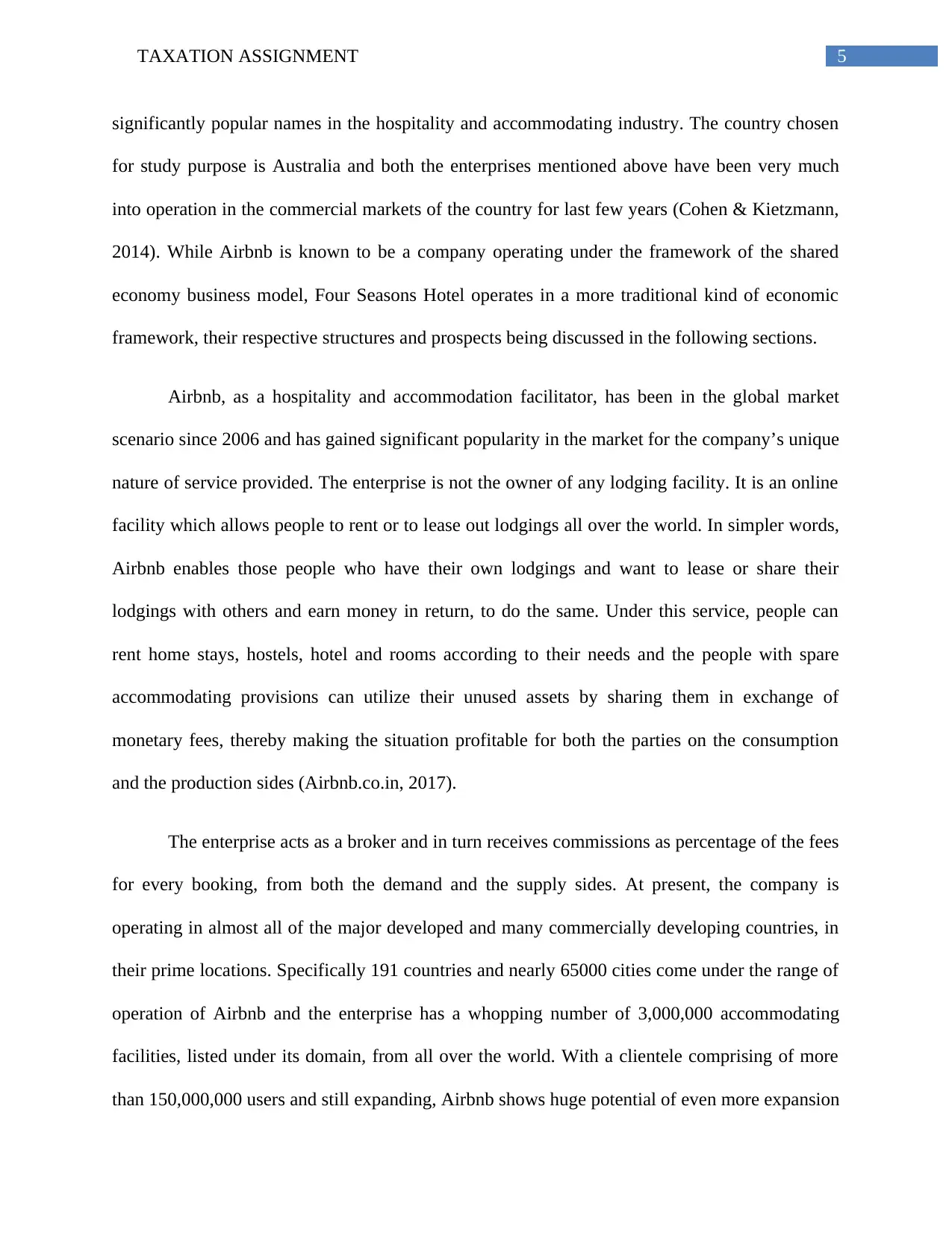
5TAXATION ASSIGNMENT
significantly popular names in the hospitality and accommodating industry. The country chosen
for study purpose is Australia and both the enterprises mentioned above have been very much
into operation in the commercial markets of the country for last few years (Cohen & Kietzmann,
2014). While Airbnb is known to be a company operating under the framework of the shared
economy business model, Four Seasons Hotel operates in a more traditional kind of economic
framework, their respective structures and prospects being discussed in the following sections.
Airbnb, as a hospitality and accommodation facilitator, has been in the global market
scenario since 2006 and has gained significant popularity in the market for the company’s unique
nature of service provided. The enterprise is not the owner of any lodging facility. It is an online
facility which allows people to rent or to lease out lodgings all over the world. In simpler words,
Airbnb enables those people who have their own lodgings and want to lease or share their
lodgings with others and earn money in return, to do the same. Under this service, people can
rent home stays, hostels, hotel and rooms according to their needs and the people with spare
accommodating provisions can utilize their unused assets by sharing them in exchange of
monetary fees, thereby making the situation profitable for both the parties on the consumption
and the production sides (Airbnb.co.in, 2017).
The enterprise acts as a broker and in turn receives commissions as percentage of the fees
for every booking, from both the demand and the supply sides. At present, the company is
operating in almost all of the major developed and many commercially developing countries, in
their prime locations. Specifically 191 countries and nearly 65000 cities come under the range of
operation of Airbnb and the enterprise has a whopping number of 3,000,000 accommodating
facilities, listed under its domain, from all over the world. With a clientele comprising of more
than 150,000,000 users and still expanding, Airbnb shows huge potential of even more expansion
significantly popular names in the hospitality and accommodating industry. The country chosen
for study purpose is Australia and both the enterprises mentioned above have been very much
into operation in the commercial markets of the country for last few years (Cohen & Kietzmann,
2014). While Airbnb is known to be a company operating under the framework of the shared
economy business model, Four Seasons Hotel operates in a more traditional kind of economic
framework, their respective structures and prospects being discussed in the following sections.
Airbnb, as a hospitality and accommodation facilitator, has been in the global market
scenario since 2006 and has gained significant popularity in the market for the company’s unique
nature of service provided. The enterprise is not the owner of any lodging facility. It is an online
facility which allows people to rent or to lease out lodgings all over the world. In simpler words,
Airbnb enables those people who have their own lodgings and want to lease or share their
lodgings with others and earn money in return, to do the same. Under this service, people can
rent home stays, hostels, hotel and rooms according to their needs and the people with spare
accommodating provisions can utilize their unused assets by sharing them in exchange of
monetary fees, thereby making the situation profitable for both the parties on the consumption
and the production sides (Airbnb.co.in, 2017).
The enterprise acts as a broker and in turn receives commissions as percentage of the fees
for every booking, from both the demand and the supply sides. At present, the company is
operating in almost all of the major developed and many commercially developing countries, in
their prime locations. Specifically 191 countries and nearly 65000 cities come under the range of
operation of Airbnb and the enterprise has a whopping number of 3,000,000 accommodating
facilities, listed under its domain, from all over the world. With a clientele comprising of more
than 150,000,000 users and still expanding, Airbnb shows huge potential of even more expansion
⊘ This is a preview!⊘
Do you want full access?
Subscribe today to unlock all pages.

Trusted by 1+ million students worldwide
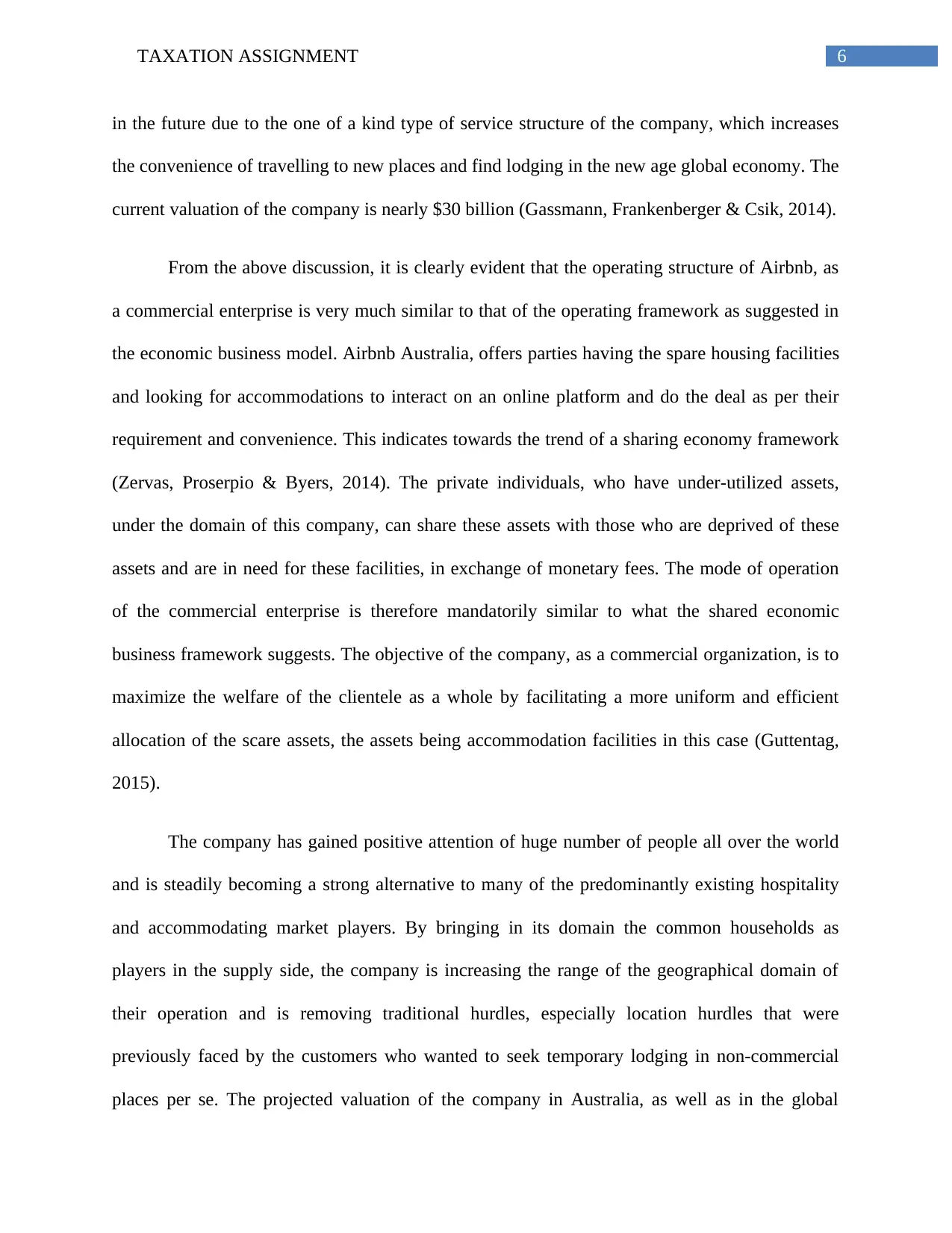
6TAXATION ASSIGNMENT
in the future due to the one of a kind type of service structure of the company, which increases
the convenience of travelling to new places and find lodging in the new age global economy. The
current valuation of the company is nearly $30 billion (Gassmann, Frankenberger & Csik, 2014).
From the above discussion, it is clearly evident that the operating structure of Airbnb, as
a commercial enterprise is very much similar to that of the operating framework as suggested in
the economic business model. Airbnb Australia, offers parties having the spare housing facilities
and looking for accommodations to interact on an online platform and do the deal as per their
requirement and convenience. This indicates towards the trend of a sharing economy framework
(Zervas, Proserpio & Byers, 2014). The private individuals, who have under-utilized assets,
under the domain of this company, can share these assets with those who are deprived of these
assets and are in need for these facilities, in exchange of monetary fees. The mode of operation
of the commercial enterprise is therefore mandatorily similar to what the shared economic
business framework suggests. The objective of the company, as a commercial organization, is to
maximize the welfare of the clientele as a whole by facilitating a more uniform and efficient
allocation of the scare assets, the assets being accommodation facilities in this case (Guttentag,
2015).
The company has gained positive attention of huge number of people all over the world
and is steadily becoming a strong alternative to many of the predominantly existing hospitality
and accommodating market players. By bringing in its domain the common households as
players in the supply side, the company is increasing the range of the geographical domain of
their operation and is removing traditional hurdles, especially location hurdles that were
previously faced by the customers who wanted to seek temporary lodging in non-commercial
places per se. The projected valuation of the company in Australia, as well as in the global
in the future due to the one of a kind type of service structure of the company, which increases
the convenience of travelling to new places and find lodging in the new age global economy. The
current valuation of the company is nearly $30 billion (Gassmann, Frankenberger & Csik, 2014).
From the above discussion, it is clearly evident that the operating structure of Airbnb, as
a commercial enterprise is very much similar to that of the operating framework as suggested in
the economic business model. Airbnb Australia, offers parties having the spare housing facilities
and looking for accommodations to interact on an online platform and do the deal as per their
requirement and convenience. This indicates towards the trend of a sharing economy framework
(Zervas, Proserpio & Byers, 2014). The private individuals, who have under-utilized assets,
under the domain of this company, can share these assets with those who are deprived of these
assets and are in need for these facilities, in exchange of monetary fees. The mode of operation
of the commercial enterprise is therefore mandatorily similar to what the shared economic
business framework suggests. The objective of the company, as a commercial organization, is to
maximize the welfare of the clientele as a whole by facilitating a more uniform and efficient
allocation of the scare assets, the assets being accommodation facilities in this case (Guttentag,
2015).
The company has gained positive attention of huge number of people all over the world
and is steadily becoming a strong alternative to many of the predominantly existing hospitality
and accommodating market players. By bringing in its domain the common households as
players in the supply side, the company is increasing the range of the geographical domain of
their operation and is removing traditional hurdles, especially location hurdles that were
previously faced by the customers who wanted to seek temporary lodging in non-commercial
places per se. The projected valuation of the company in Australia, as well as in the global
Paraphrase This Document
Need a fresh take? Get an instant paraphrase of this document with our AI Paraphraser
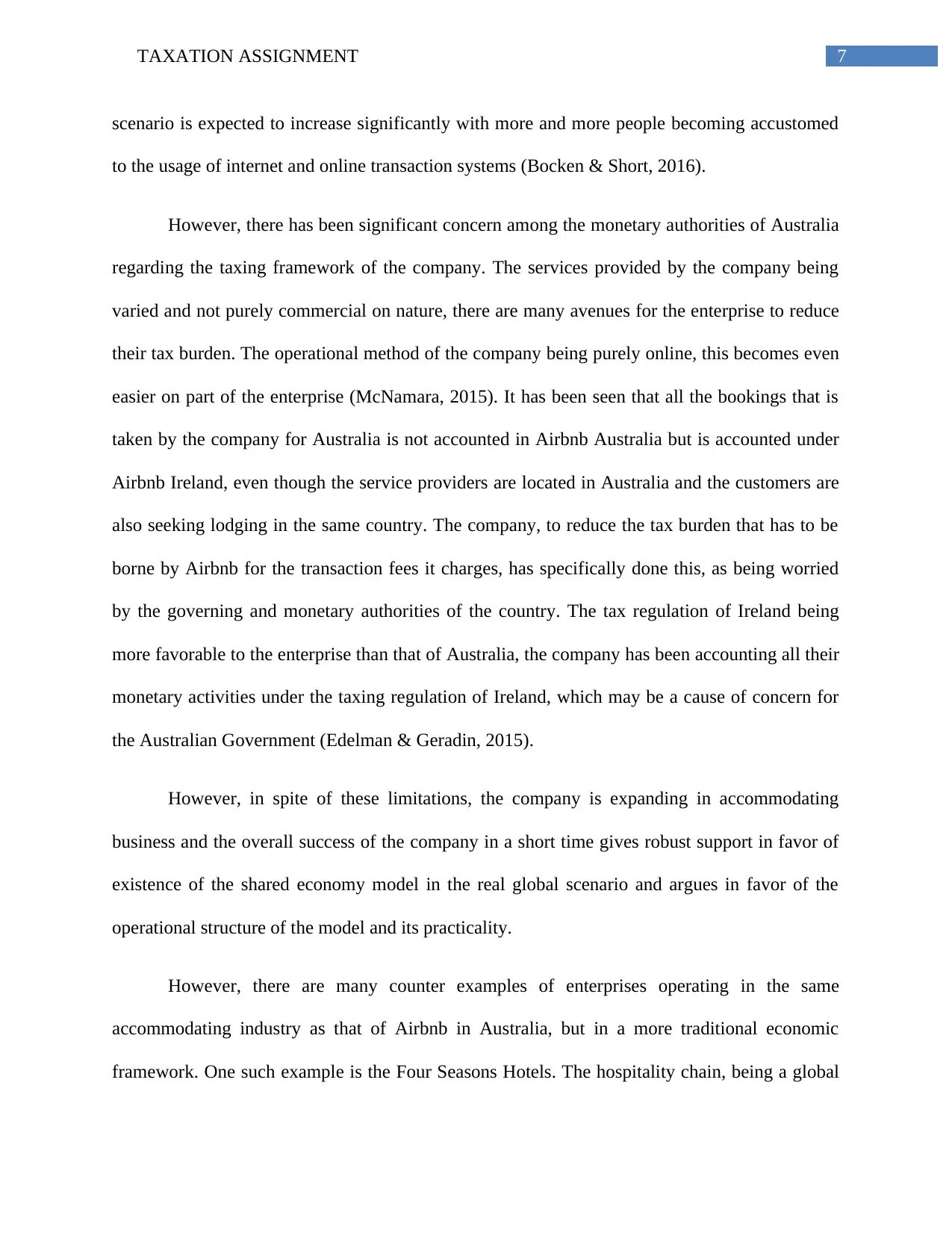
7TAXATION ASSIGNMENT
scenario is expected to increase significantly with more and more people becoming accustomed
to the usage of internet and online transaction systems (Bocken & Short, 2016).
However, there has been significant concern among the monetary authorities of Australia
regarding the taxing framework of the company. The services provided by the company being
varied and not purely commercial on nature, there are many avenues for the enterprise to reduce
their tax burden. The operational method of the company being purely online, this becomes even
easier on part of the enterprise (McNamara, 2015). It has been seen that all the bookings that is
taken by the company for Australia is not accounted in Airbnb Australia but is accounted under
Airbnb Ireland, even though the service providers are located in Australia and the customers are
also seeking lodging in the same country. The company, to reduce the tax burden that has to be
borne by Airbnb for the transaction fees it charges, has specifically done this, as being worried
by the governing and monetary authorities of the country. The tax regulation of Ireland being
more favorable to the enterprise than that of Australia, the company has been accounting all their
monetary activities under the taxing regulation of Ireland, which may be a cause of concern for
the Australian Government (Edelman & Geradin, 2015).
However, in spite of these limitations, the company is expanding in accommodating
business and the overall success of the company in a short time gives robust support in favor of
existence of the shared economy model in the real global scenario and argues in favor of the
operational structure of the model and its practicality.
However, there are many counter examples of enterprises operating in the same
accommodating industry as that of Airbnb in Australia, but in a more traditional economic
framework. One such example is the Four Seasons Hotels. The hospitality chain, being a global
scenario is expected to increase significantly with more and more people becoming accustomed
to the usage of internet and online transaction systems (Bocken & Short, 2016).
However, there has been significant concern among the monetary authorities of Australia
regarding the taxing framework of the company. The services provided by the company being
varied and not purely commercial on nature, there are many avenues for the enterprise to reduce
their tax burden. The operational method of the company being purely online, this becomes even
easier on part of the enterprise (McNamara, 2015). It has been seen that all the bookings that is
taken by the company for Australia is not accounted in Airbnb Australia but is accounted under
Airbnb Ireland, even though the service providers are located in Australia and the customers are
also seeking lodging in the same country. The company, to reduce the tax burden that has to be
borne by Airbnb for the transaction fees it charges, has specifically done this, as being worried
by the governing and monetary authorities of the country. The tax regulation of Ireland being
more favorable to the enterprise than that of Australia, the company has been accounting all their
monetary activities under the taxing regulation of Ireland, which may be a cause of concern for
the Australian Government (Edelman & Geradin, 2015).
However, in spite of these limitations, the company is expanding in accommodating
business and the overall success of the company in a short time gives robust support in favor of
existence of the shared economy model in the real global scenario and argues in favor of the
operational structure of the model and its practicality.
However, there are many counter examples of enterprises operating in the same
accommodating industry as that of Airbnb in Australia, but in a more traditional economic
framework. One such example is the Four Seasons Hotels. The hospitality chain, being a global
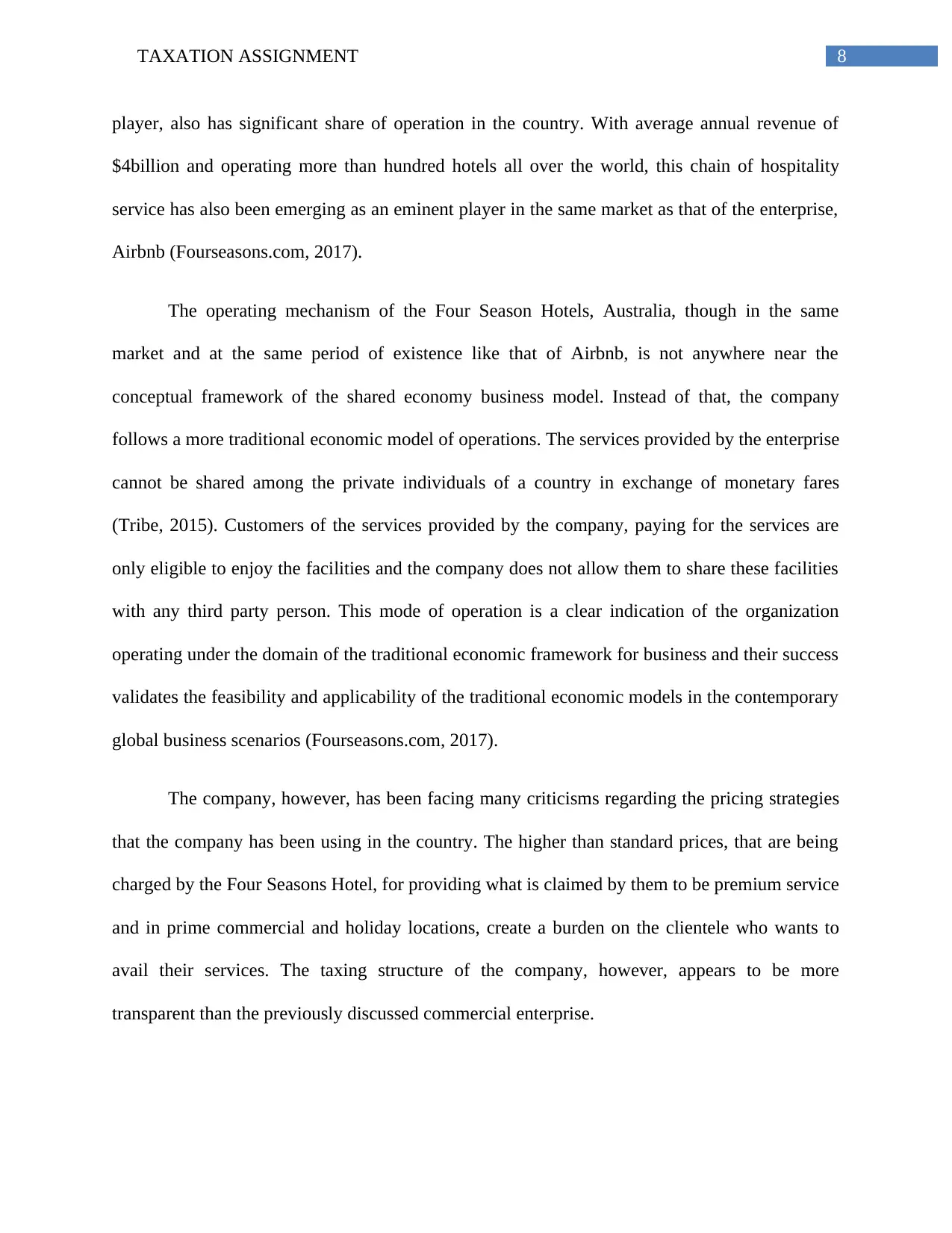
8TAXATION ASSIGNMENT
player, also has significant share of operation in the country. With average annual revenue of
$4billion and operating more than hundred hotels all over the world, this chain of hospitality
service has also been emerging as an eminent player in the same market as that of the enterprise,
Airbnb (Fourseasons.com, 2017).
The operating mechanism of the Four Season Hotels, Australia, though in the same
market and at the same period of existence like that of Airbnb, is not anywhere near the
conceptual framework of the shared economy business model. Instead of that, the company
follows a more traditional economic model of operations. The services provided by the enterprise
cannot be shared among the private individuals of a country in exchange of monetary fares
(Tribe, 2015). Customers of the services provided by the company, paying for the services are
only eligible to enjoy the facilities and the company does not allow them to share these facilities
with any third party person. This mode of operation is a clear indication of the organization
operating under the domain of the traditional economic framework for business and their success
validates the feasibility and applicability of the traditional economic models in the contemporary
global business scenarios (Fourseasons.com, 2017).
The company, however, has been facing many criticisms regarding the pricing strategies
that the company has been using in the country. The higher than standard prices, that are being
charged by the Four Seasons Hotel, for providing what is claimed by them to be premium service
and in prime commercial and holiday locations, create a burden on the clientele who wants to
avail their services. The taxing structure of the company, however, appears to be more
transparent than the previously discussed commercial enterprise.
player, also has significant share of operation in the country. With average annual revenue of
$4billion and operating more than hundred hotels all over the world, this chain of hospitality
service has also been emerging as an eminent player in the same market as that of the enterprise,
Airbnb (Fourseasons.com, 2017).
The operating mechanism of the Four Season Hotels, Australia, though in the same
market and at the same period of existence like that of Airbnb, is not anywhere near the
conceptual framework of the shared economy business model. Instead of that, the company
follows a more traditional economic model of operations. The services provided by the enterprise
cannot be shared among the private individuals of a country in exchange of monetary fares
(Tribe, 2015). Customers of the services provided by the company, paying for the services are
only eligible to enjoy the facilities and the company does not allow them to share these facilities
with any third party person. This mode of operation is a clear indication of the organization
operating under the domain of the traditional economic framework for business and their success
validates the feasibility and applicability of the traditional economic models in the contemporary
global business scenarios (Fourseasons.com, 2017).
The company, however, has been facing many criticisms regarding the pricing strategies
that the company has been using in the country. The higher than standard prices, that are being
charged by the Four Seasons Hotel, for providing what is claimed by them to be premium service
and in prime commercial and holiday locations, create a burden on the clientele who wants to
avail their services. The taxing structure of the company, however, appears to be more
transparent than the previously discussed commercial enterprise.
⊘ This is a preview!⊘
Do you want full access?
Subscribe today to unlock all pages.

Trusted by 1+ million students worldwide
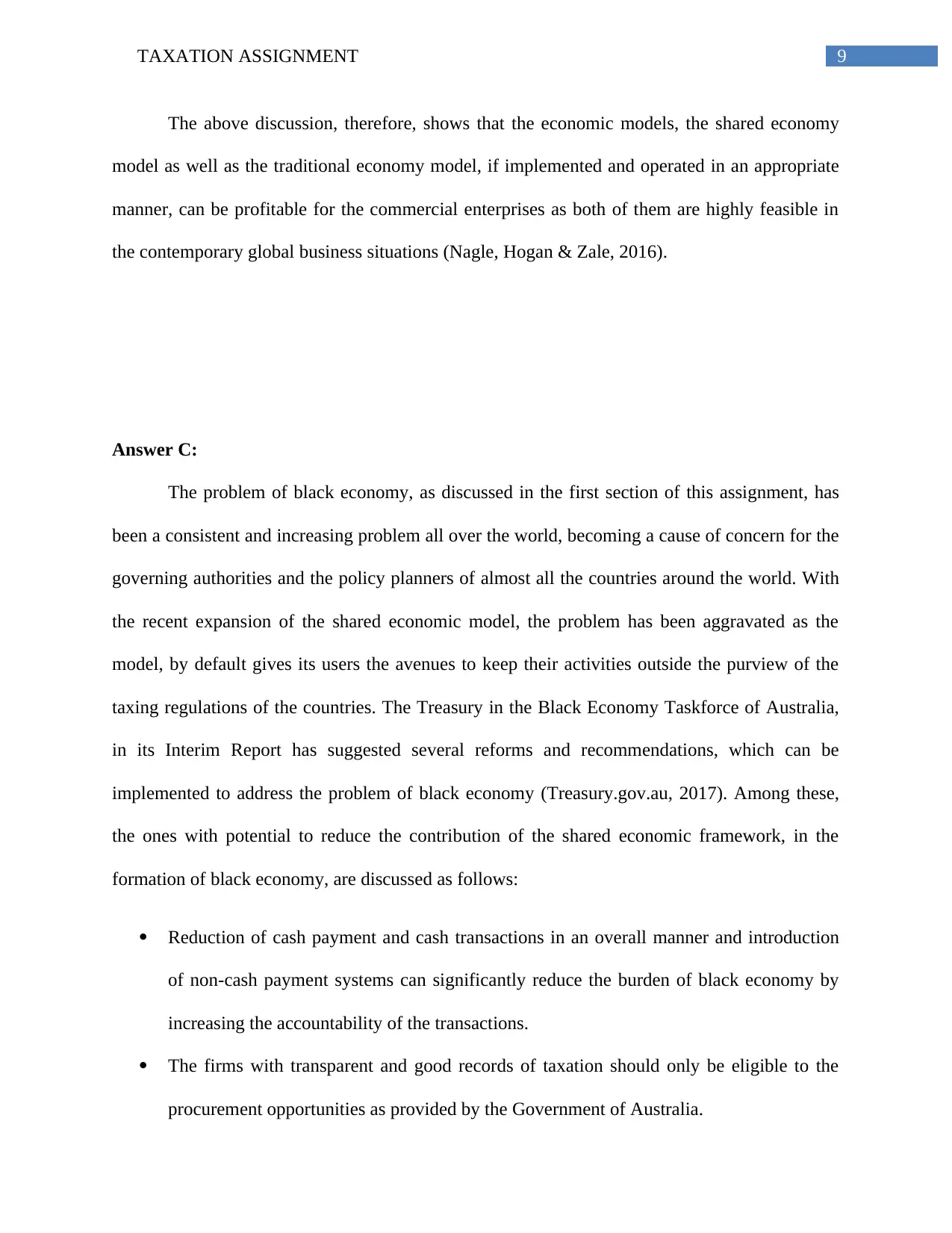
9TAXATION ASSIGNMENT
The above discussion, therefore, shows that the economic models, the shared economy
model as well as the traditional economy model, if implemented and operated in an appropriate
manner, can be profitable for the commercial enterprises as both of them are highly feasible in
the contemporary global business situations (Nagle, Hogan & Zale, 2016).
Answer C:
The problem of black economy, as discussed in the first section of this assignment, has
been a consistent and increasing problem all over the world, becoming a cause of concern for the
governing authorities and the policy planners of almost all the countries around the world. With
the recent expansion of the shared economic model, the problem has been aggravated as the
model, by default gives its users the avenues to keep their activities outside the purview of the
taxing regulations of the countries. The Treasury in the Black Economy Taskforce of Australia,
in its Interim Report has suggested several reforms and recommendations, which can be
implemented to address the problem of black economy (Treasury.gov.au, 2017). Among these,
the ones with potential to reduce the contribution of the shared economic framework, in the
formation of black economy, are discussed as follows:
Reduction of cash payment and cash transactions in an overall manner and introduction
of non-cash payment systems can significantly reduce the burden of black economy by
increasing the accountability of the transactions.
The firms with transparent and good records of taxation should only be eligible to the
procurement opportunities as provided by the Government of Australia.
The above discussion, therefore, shows that the economic models, the shared economy
model as well as the traditional economy model, if implemented and operated in an appropriate
manner, can be profitable for the commercial enterprises as both of them are highly feasible in
the contemporary global business situations (Nagle, Hogan & Zale, 2016).
Answer C:
The problem of black economy, as discussed in the first section of this assignment, has
been a consistent and increasing problem all over the world, becoming a cause of concern for the
governing authorities and the policy planners of almost all the countries around the world. With
the recent expansion of the shared economic model, the problem has been aggravated as the
model, by default gives its users the avenues to keep their activities outside the purview of the
taxing regulations of the countries. The Treasury in the Black Economy Taskforce of Australia,
in its Interim Report has suggested several reforms and recommendations, which can be
implemented to address the problem of black economy (Treasury.gov.au, 2017). Among these,
the ones with potential to reduce the contribution of the shared economic framework, in the
formation of black economy, are discussed as follows:
Reduction of cash payment and cash transactions in an overall manner and introduction
of non-cash payment systems can significantly reduce the burden of black economy by
increasing the accountability of the transactions.
The firms with transparent and good records of taxation should only be eligible to the
procurement opportunities as provided by the Government of Australia.
Paraphrase This Document
Need a fresh take? Get an instant paraphrase of this document with our AI Paraphraser
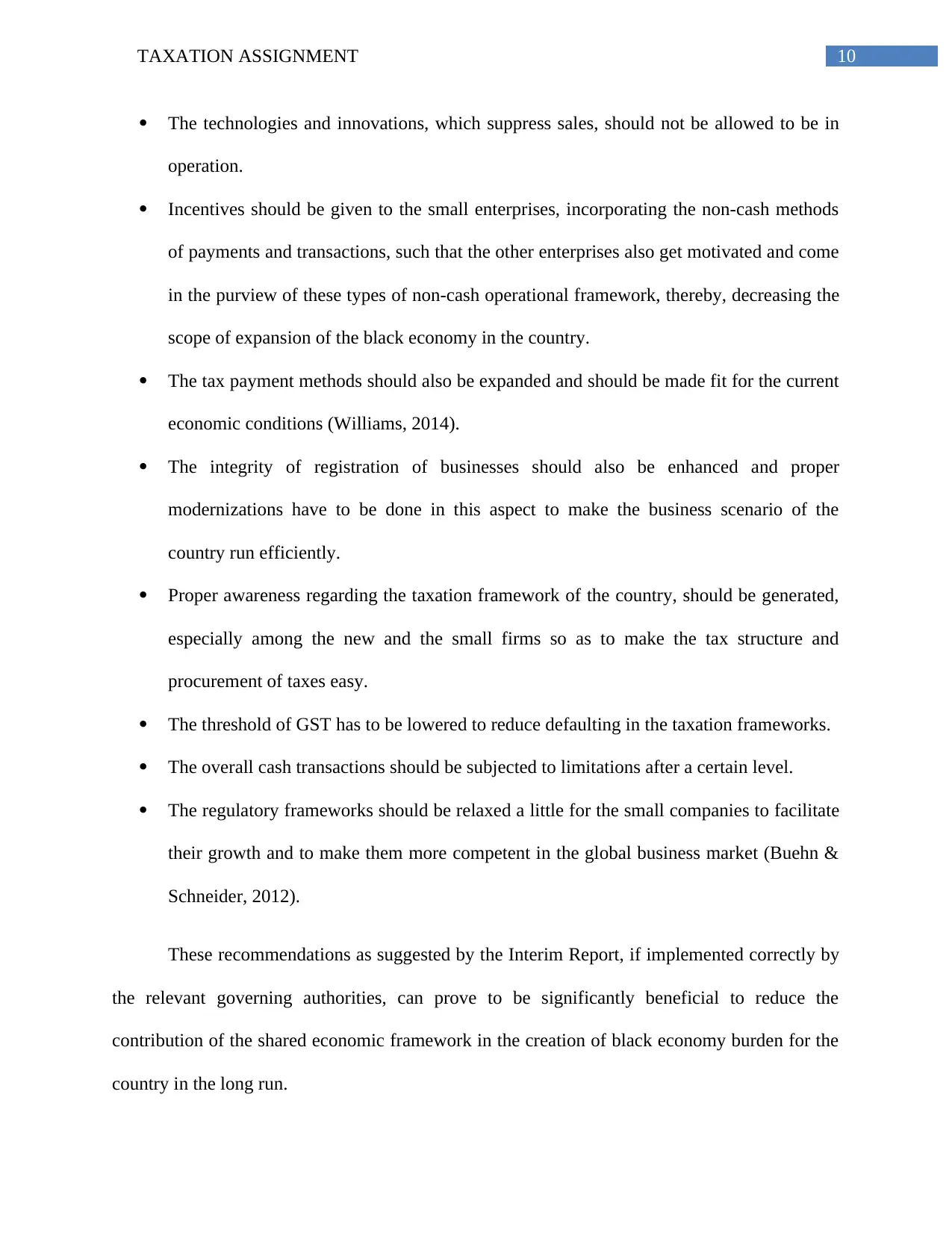
10TAXATION ASSIGNMENT
The technologies and innovations, which suppress sales, should not be allowed to be in
operation.
Incentives should be given to the small enterprises, incorporating the non-cash methods
of payments and transactions, such that the other enterprises also get motivated and come
in the purview of these types of non-cash operational framework, thereby, decreasing the
scope of expansion of the black economy in the country.
The tax payment methods should also be expanded and should be made fit for the current
economic conditions (Williams, 2014).
The integrity of registration of businesses should also be enhanced and proper
modernizations have to be done in this aspect to make the business scenario of the
country run efficiently.
Proper awareness regarding the taxation framework of the country, should be generated,
especially among the new and the small firms so as to make the tax structure and
procurement of taxes easy.
The threshold of GST has to be lowered to reduce defaulting in the taxation frameworks.
The overall cash transactions should be subjected to limitations after a certain level.
The regulatory frameworks should be relaxed a little for the small companies to facilitate
their growth and to make them more competent in the global business market (Buehn &
Schneider, 2012).
These recommendations as suggested by the Interim Report, if implemented correctly by
the relevant governing authorities, can prove to be significantly beneficial to reduce the
contribution of the shared economic framework in the creation of black economy burden for the
country in the long run.
The technologies and innovations, which suppress sales, should not be allowed to be in
operation.
Incentives should be given to the small enterprises, incorporating the non-cash methods
of payments and transactions, such that the other enterprises also get motivated and come
in the purview of these types of non-cash operational framework, thereby, decreasing the
scope of expansion of the black economy in the country.
The tax payment methods should also be expanded and should be made fit for the current
economic conditions (Williams, 2014).
The integrity of registration of businesses should also be enhanced and proper
modernizations have to be done in this aspect to make the business scenario of the
country run efficiently.
Proper awareness regarding the taxation framework of the country, should be generated,
especially among the new and the small firms so as to make the tax structure and
procurement of taxes easy.
The threshold of GST has to be lowered to reduce defaulting in the taxation frameworks.
The overall cash transactions should be subjected to limitations after a certain level.
The regulatory frameworks should be relaxed a little for the small companies to facilitate
their growth and to make them more competent in the global business market (Buehn &
Schneider, 2012).
These recommendations as suggested by the Interim Report, if implemented correctly by
the relevant governing authorities, can prove to be significantly beneficial to reduce the
contribution of the shared economic framework in the creation of black economy burden for the
country in the long run.
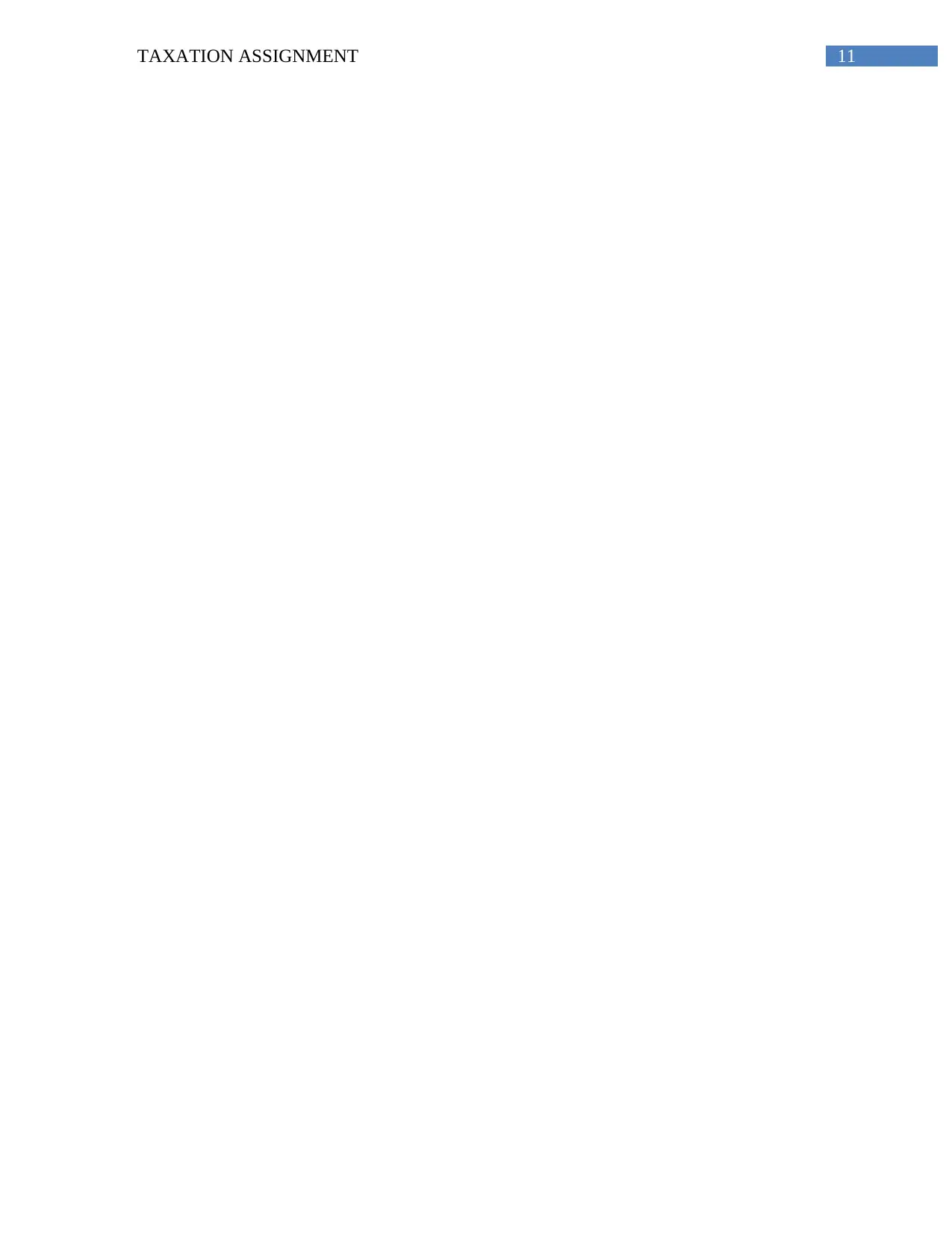
11TAXATION ASSIGNMENT
⊘ This is a preview!⊘
Do you want full access?
Subscribe today to unlock all pages.

Trusted by 1+ million students worldwide
1 out of 15
Related Documents
Your All-in-One AI-Powered Toolkit for Academic Success.
+13062052269
info@desklib.com
Available 24*7 on WhatsApp / Email
![[object Object]](/_next/static/media/star-bottom.7253800d.svg)
Unlock your academic potential
Copyright © 2020–2026 A2Z Services. All Rights Reserved. Developed and managed by ZUCOL.





